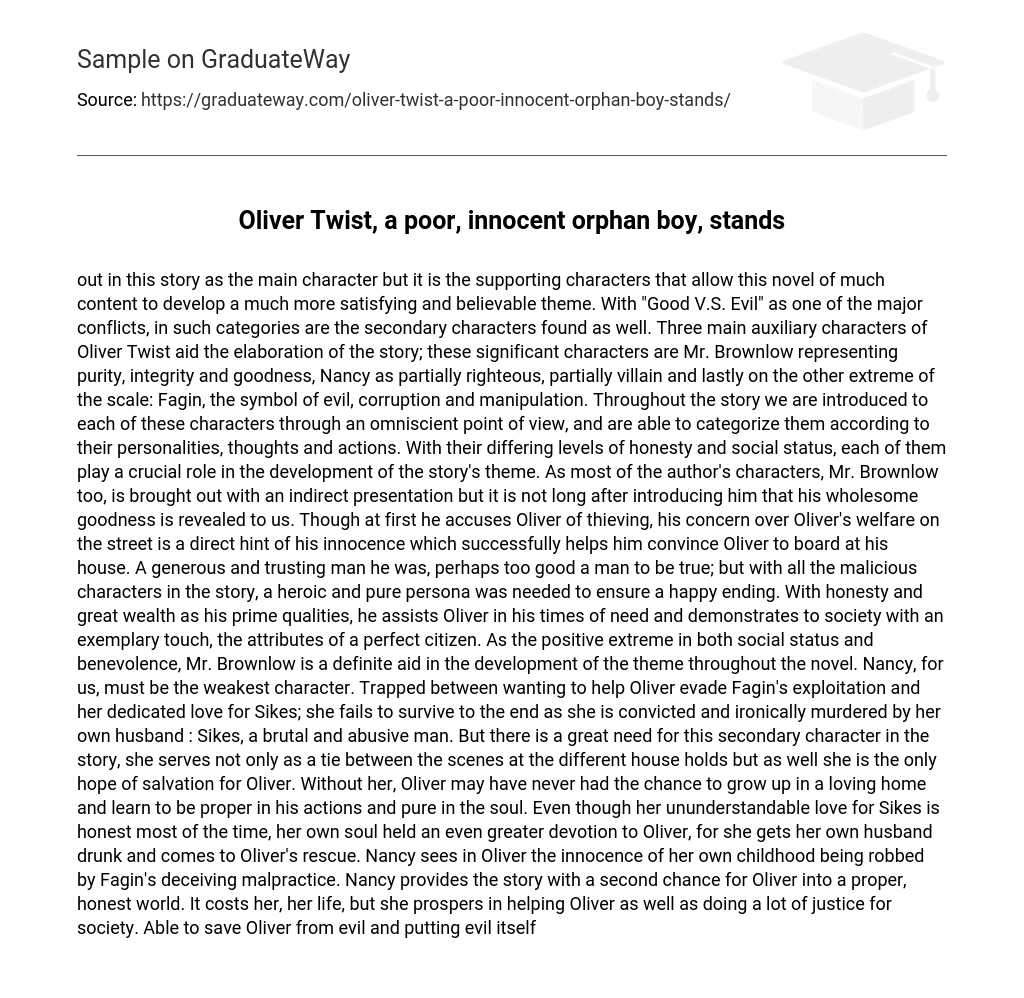While the main character stands out in this story, it is the supporting characters that facilitate the development of a satisfying and believable theme in this content-rich novel. The secondary characters also play a significant role in the major conflict of “Good vs. Evil”.
The story of Oliver Twist features three significant supporting characters: Mr. Brownlow, who symbolizes purity, integrity, and goodness; Nancy, a complex character with both righteous and villainous qualities; and Fagin, who embodies evilness, corruption, and manipulation. Throughout the narrative, these characters are introduced from an omniscient perspective which allows us to classify them based on their personalities, thoughts, and actions. Each character plays a vital role in developing the theme of the story due to their varying levels of honesty and social status. Similar to other characters created by the author, Mr. Brownlow is initially presented indirectly but quickly reveals his inherent wholesomeness.
Despite initially accusing Oliver of stealing, Mr. Brownlow’s concern for Oliver’s well-being on the streets suggests his innocence. This concern eventually convinces Oliver to come live at his house. Mr. Brownlow is a generous and trusting man, almost too good to be true. In a story filled with malicious characters, his heroic and pure persona is necessary for a happy ending. With honesty and great wealth as his main qualities, he assists Oliver when he needs help and serves as an exemplar of a perfect citizen to society. As someone who possesses both high social status and benevolence, Mr. Brownlow significantly contributes to the novel’s theme.
Nancy is depicted as the weakest character in the story, torn between her desire to help Oliver escape Fagin’s exploitation and her devoted love for the brutal and abusive Sikes. Tragically, she does not survive till the end, as she is convicted and murdered by her own husband. However, Nancy plays a crucial role in the narrative. She not only serves as a link between different households but also represents Oliver’s only hope of salvation. Without her, Oliver may have never experienced a loving home environment and learned proper conduct. Despite her incomprehensible affection for Sikes, Nancy’s true devotion lies with Oliver. This is evident when she gets her husband intoxicated and comes to Oliver’s rescue.
Nancy embodies the innocence that was stolen from her own childhood by Fagin’s deceitful practices. She offers Oliver a chance to experience a proper and honest world, even at the cost of her own life. In helping Oliver and serving justice for society, Nancy’s actions stand out among her wicked associates and play a crucial role in Oliver’s journey to safety. Not only does she introduce new storylines, but she also serves as a strong pillar for the central theme. Her character is a testament to careful planning and thoughtful creation.
The author portrays Fagin, a Jewish individual, in a manner that may lead one to think that Dickens had racist tendencies. According to the author, Fagin believed that while Jews rarely steal, they are even worse than thieves when they encourage others to steal. The author also suggests that whenever a robbery occurs, the stolen goods are hidden until a Jew is found and a deal is made. Fagin’s character in this story is described in such a way that it almost compels readers to dislike him. He is depicted as old, ugly, and identified as a Jew. Fagin is associated with certain narrative techniques that give the novel a distinctive impact.
Fagin not only seeks to capture Oliver forever by involving him in crime, but he also possesses supernatural abilities to locate him wherever his allies may hide him. Fagin serves as the true antagonist, comparable to the devil himself in relation to an innocent individual. Despite the complexity and subjective nature of its content, “Oliver Twist” ultimately follows the structure of an escapade, where the villain receives their just punishment and the hero finds happiness. Fagin, deserving of his fate, ends up in prison and descends into madness, while Oliver, a pure-hearted young boy, finds a loving family and a wonderful home. However, Fagin is not entirely despicable because, upon realizing that his stolen possessions hold no value in jail, he returns Oliver’s mother Agnes’ ring, which subsequently unveils Oliver’s lineage and adds coherence to the story.
The intricate secondary figures in this narrative allow it to effectively portray and impact various social strata, including the affluent, the destitute, and the average individual. These characters also contribute to the overarching theme of this tale, which encapsulates the realities of England’s nineteenth-century society. The story highlights the prevalent poverty and significant social issues of this era, creating a dichotomy between two distinct classes: the wealthy and the impoverished. Moreover, these classes encompass divergent moral forces, representing notions of goodness and evil.
The text suggests that the novel portrays a similarity between good and bad within all social classes, just as it exists in real life. This indicates that regardless of wealth or education, individuals possess the ability to distinguish right from wrong and are free to make choices in their lives, with the caveat that they must accept the consequences. Even as a young boy, Oliver demonstrates this ability by choosing not to steal. As a result, he is rewarded with a happy home and a promising future. Conversely, Fagin’s judgment proves to be lacking, leading him to a life of insanity in jail until his death.





